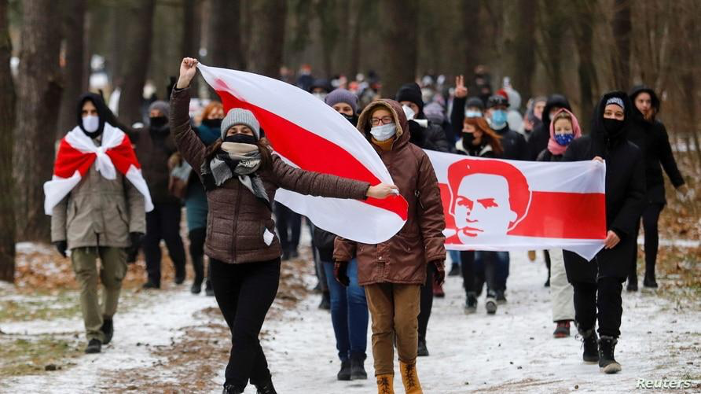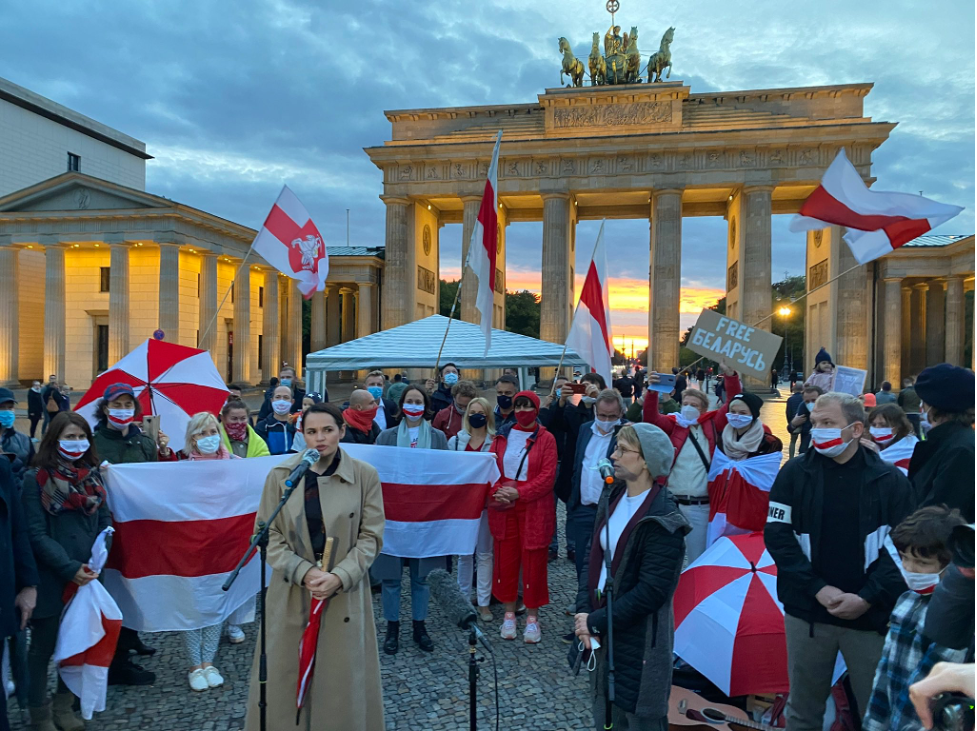Newsletter: Dec 7-14
BELARUS
Dec 8: Two years in prison for writing on a sidewalk. Five Belarusians were judged guilty, four of them sentenced to prison terms for writing “We won’t forget” near the memorial to Alexander Taraikovsky who was murdered in Aug. Frunzensky district court judged 25-year old Maria Bobovich and 26-year old Maxim Pavlyuschik guilty of a felony and sentenced them to 2 years in prison and 1.5 years of restriction of freedom respectively. Maria and Maxim didn’t know each other before. Maria began writing, and Maxim approached her later and asked for a paintbrush to finish the phrase. Both were arrested. Three more people were convicted for the same thing later that day. Denis Grekhanov, 42, and Igor Samusenko, 25, got 1.5 years in prison. Vladislav Gulis, 25, got two years.
Dec 10: Opposition flags banned. Displaying white-red-white flags on windows and balconies will be regarded as participation in an unauthorized protest. Under the new law, showing ‘unregistered symbols’ is a violation of Art. 10 of the law ‘On Mass Events’; the regime ‘law enforcement’ will consider it as holding a mass event. Offenders can be sentenced up to 15 days in jail.
Dec 10: Belarus closed its land border restricting movement of residents due to “COVID-19”. People believe this is an excuse to stop the brain drain and emigration, and increase the crackdown on activists. The usurper has been openly mocking COVID restrictive measures and ignoring the pandemic.
Dec 10: Belarus confirmed its status as Europe’s most dangerous country for journalists, Reporters Without Borders confirmed on International Human Rights Day, Dec 10. Nearly 370 journalists were arrested since the elections, around 80 were sentenced to prison, and at least 62 have been mistreated and tortured while detained.
Dec 12: 87 y.o. Holocaust survivor on trial in Minsk. Elizaveta Bursava, an 87-year-old Jewish woman, who survived the WWII and the Holocaust, will be on trial next week for displaying the white-red-white flag on the balcony of the apartment she owns. Bursava ran away with her father and grandmother in 1941, while 16 of her relatives were killed in the Viciebsk ghetto.
Dec 13: March of People. This is the 18th consecutive weekend march since the falsified elections took place in Belarus on August 9, 2020. Since the regime security forces intensified crackdowns on protestors, a partisan march tactic has been employed. Residents across all cities, connect via “neighbour” chats and hold peaceful rallies close to homes in their residential districts. Around 300 people were detained. Solidarity events took taking place in Russia, Lithuania, Ukraine, Poland, Italy, Germany, the USA, and other countries.

People’s Sunday march
INTERNATIONAL
Dec 7: Usurper banned by the International Olympic Committee. International Olympic Committee banned the illegitimate president of Belarus, from all Olympic activities for discriminating and setting repressions against athletes for their political opinions and activism, which is contrary to the Olympic movement principles.
Dec 9: Washington Post article on Belarus. The Washington Post article summarizes the complexity of Belarus’s geopolitical position and explores its current options to transition to democracy.
Dec 9: Lithuania sets a precedent opening pre-trial investigation on Belarus. Lithuanian prosecutors launched a pre-trial investigation into crimes against humanity under a complaint by a Belarusian citizen, Maksim Kharoshyn. More countries should join and launch investigations under the principle of universal jurisdiction.
Dec 10: Belarus suspended the human rights dialogue with the EU. The EU’s Special Representative for Human Rights talked to DW about what the EU can do and the possibility of an international tribunal. “There are no meaningful contacts. I have not had direct contact with the Belarus authorities since the August 9 elections”, says Eamon Gilmore, the EU’s Special Representative for Human Rights. “What we have seen since August 9 is a serious deterioration in the human rights situation. 30,000 people arrested, 900 peaceful protesters against whom charges have been brought, whereas we haven’t seen a single charge brought against the perpetrators of the violence against protesters or the sexual violence.”
Dec 11: The rate of protester’s incarcerations is increasing in Belarus (Deutsche Welle). People get arrested and sentenced for stating their opinions, having white-red-white symbols of Belarusian fight for freedom on display, managing Telegram chats, and channels. The protesters are facing criminal charges under the regime’s judicial system.
Dec 12: The imprisoned Maryia Kalesnikava awarded a human rights award. Maryia Kalesnikava, one of the imprisoned leaders of the Belarusian opposition and a political prisoner of conscience will be honored for her fight for freedom and democracy by the Baum Foundation’s 2021 human rights award.
Dec 12: Switzerland freezes the usurper’s assets. Swiss authorities froze the financial assets of Belarus’s self-proclaimed president. The usurper and his son are banned from entering and traveling through Switzerland.
Dec 13: Sviatlana Tsikhanouskaya Is Overcoming Her Fears (Interview with the New Yorker). The New Yorker interviewed the leader of the Belarusian opposition Sviatlana Tsikhanouskaya
Dec 13: Sviatlana Tsikhanouskaya travels to Berlin, Germany. Sviatlana Tsikhanouskaya has visited Berlin on Dec 13-14 to attend the ecumenical prayer at the Berlin Cathedral, met Federal President Steinmeier, Bundestag President Schäuble, and Jan Hecker, Advisor to Chancellor Merkel.

Tsikhanouskaya in Berlin
